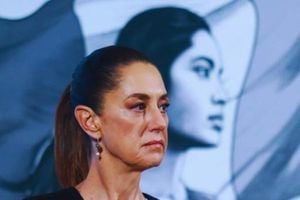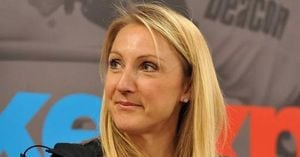Alix Earle, a prominent social media influencer, has made headlines recently after settling a $1 million lawsuit against Gymshark, a British fitness apparel company. The controversy began when Earle claimed that Gymshark severed ties with her due to her public support for Israel, which sparked significant backlash online. This legal battle has not only highlighted the complexities of influencer-brand relationships but also raised questions about censorship and freedom of expression in the digital age.
The lawsuit, filed in the U.K. High Court, alleged that Gymshark terminated a lucrative sponsorship deal with Earle after her Instagram post stating, "Now and always, we stand with the people of Israel." This statement came in the wake of the October 7 attacks by Hamas and the subsequent Israeli military response, which ignited heated discussions across social media platforms.
According to court documents, Earle's agreement with Gymshark was reportedly worth $1 million and included three TikTok videos, four Instagram posts, a branded photoshoot, and an appearance at a Gymshark event. Earle's legal team argued that Gymshark was aware of her political views before finalizing the deal, asserting that the termination was unjustified and amounted to a breach of contract.
Despite Gymshark's denial of having a formal contract with Earle, the brand eventually settled the lawsuit out of court in 2024. The settlement raised eyebrows, especially considering Gymshark's history of influencer marketing, which has been a cornerstone of its business model since its inception in 2012.
The influencer economy is currently facing a reckoning as brands navigate the delicate balance between supporting their ambassadors' freedom of expression and managing the potential backlash from consumers. Earle's situation exemplifies the challenges influencers face when their personal beliefs clash with the values or image of the brands they represent.
In a recent Instagram video, Earle announced her decision to pause her podcast, "Hot Mess," which was previously part of Alex Cooper's Unwell Network. While she did not delve into the specifics of her legal battle or the reasons for her podcast hiatus, she expressed pride in her work and a commitment to continue engaging with her audience through weekly vlogs.
Earle, who boasts 4 million followers on Instagram and 7.3 million on TikTok, has built a substantial online presence through her candid beauty tutorials and lifestyle content. Her rise to fame has been marked by collaborations with various brands, but the fallout from her support for Israel has put her in the crosshairs of a broader debate about the intersection of politics and influencer marketing.
The backlash against Earle's support for Israel was swift, with many critics questioning her alignment with Gymshark's brand values, which have often emphasized inclusivity and social awareness. The comment sections of Gymshark's social media posts became battlegrounds, with users expressing their discontent over the partnership with Earle.
Gymshark's response to the controversy has been scrutinized as well. The company has maintained that it did not formally sign a contract with Earle, yet it acknowledged a letter from January 2024 indicating that Earle had breached an agreement. This contradiction has left many wondering about the nature of the relationship between the influencer and the brand.
The implications of this case extend beyond Earle and Gymshark. As brands increasingly rely on influencer marketing, they must also consider the potential repercussions of their ambassadors' political statements. The Israel-Palestine conflict has proven to be particularly polarizing, forcing companies to carefully navigate their partnerships in a way that aligns with their corporate values while also respecting their influencers' rights to express their opinions.
In a broader context, Earle's situation reflects the changing landscape of social media and the power dynamics at play. Influencers wield significant influence over their audiences, but they also face the risk of being 'canceled' when their views do not align with public sentiment or brand expectations. This precarious position can lead to a chilling effect on free speech, as influencers may hesitate to express their beliefs for fear of losing lucrative partnerships.
Despite the challenges, Earle remains undeterred. She has been spotted enjoying her time at various events, including a recent party with TikTok star Jake Shane, indicating that she continues to thrive in the influencer space. Earle's resilience serves as a reminder that while controversies may arise, the influencer economy is still robust and evolving.
As the dust settles on the Earle versus Gymshark saga, the conversation about the role of corporations in the political discourse continues. The case has illuminated the complexities of influencer branding in politically sensitive times and raised essential questions about the limits of expression in the digital age. With the influencer economy growing rapidly, brands and creators alike must navigate this new landscape thoughtfully, balancing authenticity with the potential for backlash.
Ultimately, Alix Earle's legal battle with Gymshark serves as a microcosm of the larger tensions between personal beliefs and professional obligations in the influencer world. As both parties move forward, the industry will undoubtedly watch closely, eager to see how this case shapes future influencer-brand relationships and the broader discourse surrounding freedom of speech and corporate responsibility.








